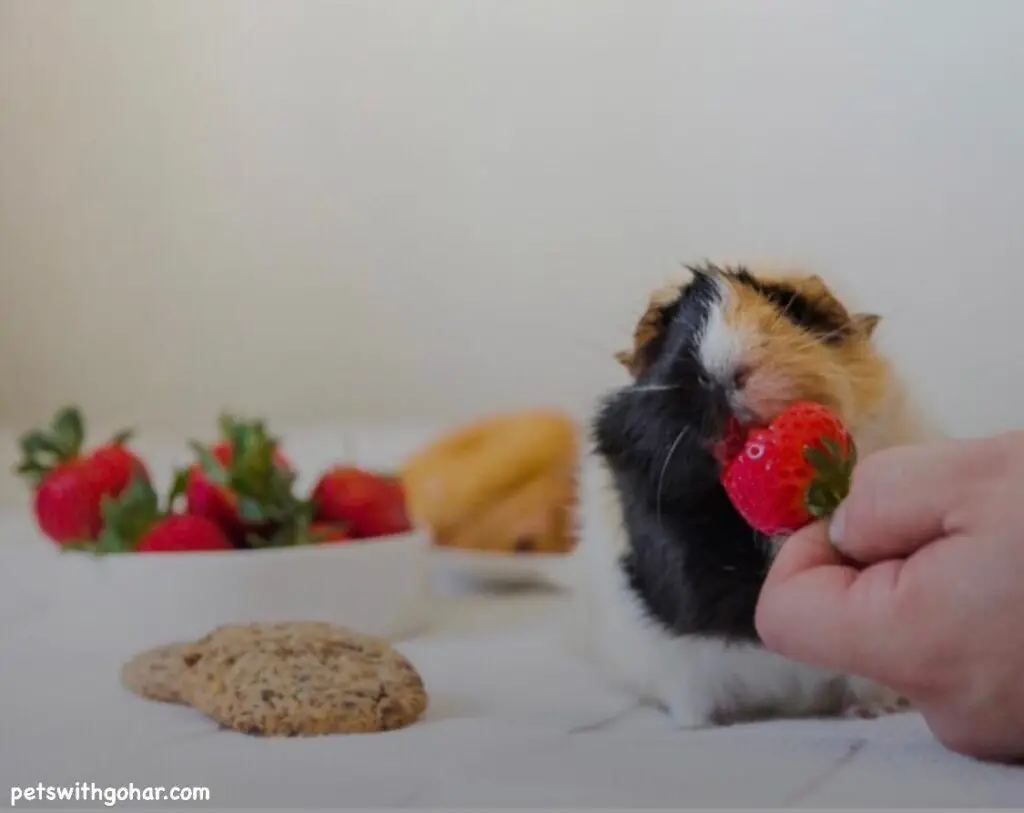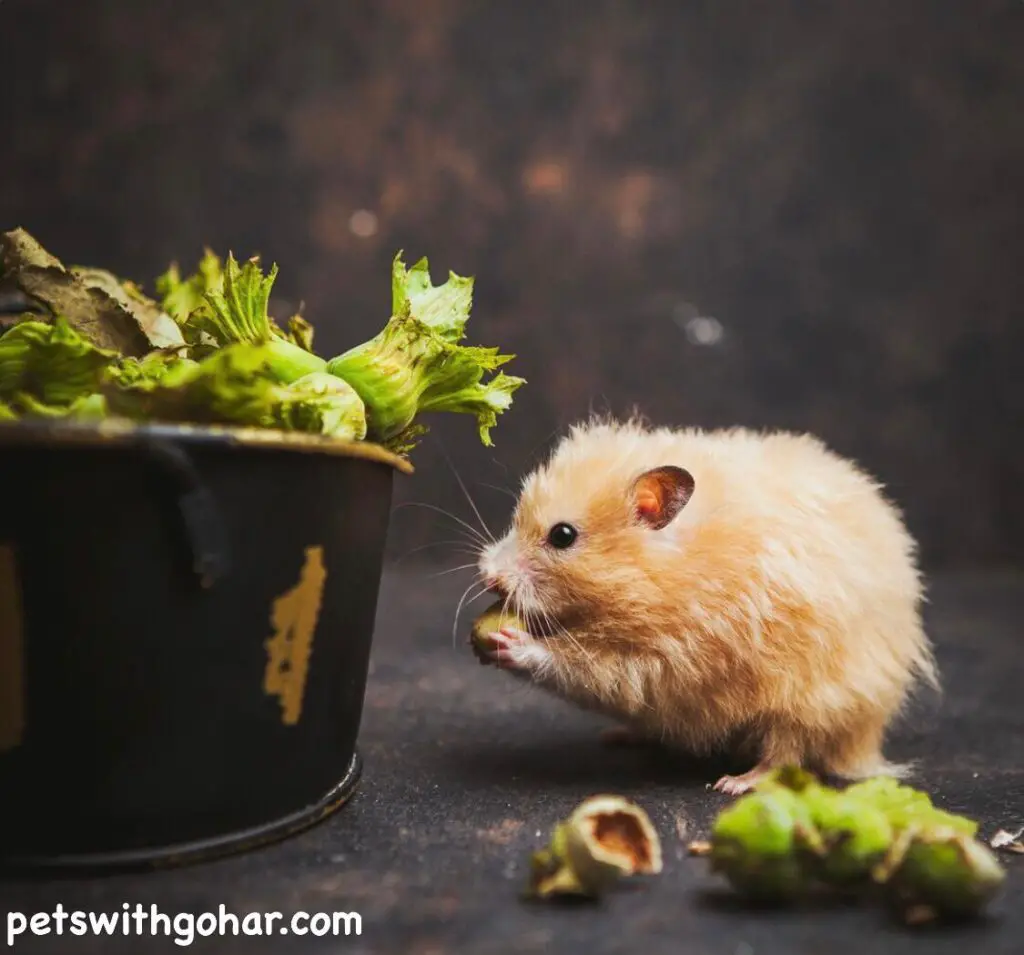For Syrian hamsters, veterinarians usually advise a well-balanced diet consisting of commercial hamster food mixed with fresh veggies, occasionally fruits, and protein sources.
A diversified meal ensures your Syrian hamster gets all the nutrients it needs for good health. Avoid sweet, fatty, or salty diets and hamster-toxic foods like chocolate, coffee, onions, garlic, grapes, and citrus fruits. To avoid obesity and other health risks, watch your hamster’s food intake and modify portion quantities.

The Hamster Diet Is Vital It’s Sensitive Play for Your Syrian Hamster and very important. The hamster needs a safe, sound diet and adequate nutrition.
If I run out of food, what can I give my hamster?
You can temporarily feed your hamster a variety of safe and suitable foods if you run out. Some options:
Fruits and vegetables fresh
Hamster-safe veggies and fruits include carrots, cucumber, bell peppers, broccoli, apple slices (without seeds), and pear slices in modest amounts. Citrus and seeded fruits are dangerous to feed.
Commercial Gifts
Commercial hamster snacks can be used in moderation as a temporary food substitute. Avoid sugary and high-fat foods and choose hamster-specific treats.
Grain and seed
Cooked rice, oats, whole wheat bread (in modest amounts), and unsalted seeds like sunflower or pumpkin seeds can nourish your hamster. Stay away from flavored grains.
Alternative Hamster Mixes
Small amounts of gerbil or mouse food mixes can be used as a temporary remedy. Make sure to check the ingredients and avoid hamster-harming substances.
Sources of Protein
Protein can be provided in tiny amounts and rarely from unseasoned foods like chicken or boiled eggs.
Hay
Hay, usually eaten by rabbits and guinea pigs, can also supply fiber for hamsters. Timothy Hay works.
New meals should be introduced slowly and in moderate amounts to avoid gastric distress. Always provide fresh water to your hamster, especially while feeding dry or fresh foods. To feed your hamster a healthy diet, restock their food when you can.
What do hamsters eat for snacks?
Hamster Treats Commercial
Many commercial hamster treats are made for them. These goodies include seed mixtures, yogurt drops, fruit sticks, and veggie chews. Treats should be moderated to avoid overfeeding.
Mealworms or Cooked Eggs
Hamsters can eat protein-rich dry mealworms and boiled or scrambled eggs without seasoning. Due to their high protein and fat content, serve these sweets sparingly.
Whole Grain Snacks
Give small amounts of whole grain snacks like Cheerios or plain oat flakes or whole wheat toast. Flavored or sugary foods can harm hamsters.
Herbs
Fresh herbs like parsley, cilantro, basil, and dill are occasional treats for some hamsters. These herbs are nutritious and varied.
To avoid overfeeding, give your hamster fresh water and watch their food intake. Rotate snacks for variety and a balanced diet.
Hamsters can eat which veggies?
Hamsters can consume several veggies. Some safe choices:
Hamsters love carrots. They are crispy and high in vitamin A and minerals.
Hamsters can cool off with cucumber, which is low in calories and hydrating.
Bell Peppers: Your hamster will enjoy a range of colored, vitamin C-rich bell peppers.
Nutritional broccoli is rich in vitamins and minerals. Treat your hamster to tiny florets.
Zucchini: Hamsters can eat zucchini because it’s low in calories and vitamin C.
Iron and other minerals are abundant in spinach. Do not overfeed your hamster, as it might cause intestinal troubles.
Romaine and leaf lettuce are healthy for hamsters in small amounts. Iceberg lettuce lacks nutrients, so avoid it.
Kale: Hamsters can occasionally eat kale, a nutritious leafy green.
Parsley: Hamsters can enjoy vitamin C-rich parsley as a treat.
Hamsters can safely eat cilantro, which tastes fresh.
Wash vegetables before feeding them to your hamster to remove pesticides. Introduce new veggies slowly to avoid stomach discomfort, and remove uneaten portions from the cage after a few hours to prevent spoiling. Your hamster needs a balanced diet, so offer veggies along with excellent food and other delights.
These are simple steps on how to give your Syrian hamster a new diet:
Commercial Hamster Food
You can feed a premium commercial hamster food mix to your Syrian hamster. Seek a combination that contains pellets, grains, nuts, and seeds. Make sure the mixture is made especially for hamsters to satisfy their dietary requirements.
Raw Vegetables
A wide range of fresh vegetables are part of the diet of Syrian hamsters. Carrots, broccoli, cucumbers, spinach, kale, and bell peppers are a few healthy choices. After giving the veggies a thorough wash, cut them into bite-sized pieces.
Fresh Fruits
You can occasionally give your Syrian hamsters some fruit as a treat. Fruits like apples (seed removed), bananas, strawberries, blueberries, and seedless grapes are suitable. Because fruit has sugar, don’t give too much of it.
Sources of Protein
Protein is essential to the diet of Syrian hamsters. As occasional treats, you can give them tiny portions of cooked meat (like chicken or turkey), boiled eggs, or mealworms.
Sweets
Treats for commercial hamsters are available and should be used sparingly. Make sure the treats you offer are suitable for hamsters and stay away from those that are overly sweet or high in fat.
Clean Water
Your Syrian hamster should always have access to clean, fresh water. To avoid spills and contamination, use a water bottle that is fastened to the cage’s side.
To prevent stomach distress, always monitor your hamster’s eating patterns and make necessary dietary adjustments. Additionally, remember to introduce new foods gradually

Commonly Asked Questions About Best Diet For Syrian Hamsters
Are almonds edible to Syrian hamsters?
Although they are not poisonous to hamsters, almonds can choke hazards due to their extreme hardness. It is advisable to refrain from giving Syrian hamsters almonds.
Are ants edible to Syrian hamsters?
Feeding ants to hamsters is not advised. They might be carrying parasites or bacteria that could injure your hamster.
Are apples edible to Syrian hamsters?
Syrian hamsters can consume apples. Remove the seeds and core, as they contain cyanide and can be harmful.
Can artichoke be eaten by Syrian hamsters?
Yes, Syrian hamsters can consume small amounts of artichokes. Before feeding, remove any tough outer leaves and cook.
Can asparagus be eaten by Syrian hamsters?
Yes, Syrian hamsters can consume asparagus. For them, it’s a safe and wholesome vegetable.
Can avocados be eaten by Syrian hamsters?
Syrian hamsters shouldn’t be fed avocados. Persin, which is found in avocados, is poisonous to hamsters and many other animals.
Can blackberries be eaten by Syrian hamsters?
Yes, blackberries are edible to Syrian hamsters. For them, they are a tasty and nourishing treat.
Do Syrian hamsters have bread tastes?
It’s advisable to refrain from giving Syrian hamsters bread. Bread is not poisonous, but if consumed in excess, it can cause obesity and has little nutritional value.
Are cheeses edible to Syrian hamsters?
As an occasional treat, small amounts of cheese can be given to Syrian hamsters. But because cheese is heavy in fat, it should only be consumed in moderation to prevent weight gain and digestive problems.
Always introduce new foods gradually, and keep an eye out for any negative reactions in your hamster. A balanced diet is crucial for your hamster’s overall health and well-being.

The Best Diet For Syrian Hamsters Pros and Cons
Pros
- Balance in Nutrition
- Dental Wellness
- Drinking plenty of Water
- Variety
- Avoids Nutritional Inadequacies
Cons
- Price
- Possible Distinctive Consumption
- Damage
- Problems with the Digestive System
- Overfeeding
The Best Diet For Syrian Hamsters Conclusion
The ideal diet for Syrian hamsters consists of a well-balanced mix of fresh veggies, occasional fruits, commercial hamster food, and protein sources. Numerous advantages of this diet include nutritional balance, variety, preventing nutritional deficiencies, promoting dental health, and staying hydrated.
Cost, the possibility of selective eating, food spoiling, overfeeding, and digestive problems are some possible downsides, but these can be minimized with careful preparation, supervision, and moderation.
Ultimately, the health, happiness, and general well-being of Syrian hamsters depend on feeding them a varied and well-balanced diet that is customized to meet their unique nutritional requirements.
You can make sure your hamster has a happy and healthy life by providing them with a variety of foods and being mindful of their dietary requirements and preferences.
FAQs on The Best Diet For Syrian Hamsters
Q: Are nuts edible to Syrian hamsters?
A: Due to their high-fat content, nuts should only be given in small amounts and unsalted as occasional treats for Syrian hamsters.
Q: Do I need to give treats to my Syrian hamster?
A: It is possible to occasionally provide treats to Syrian hamsters to enrich and vary their diet. Select hamster-specific treats; stay away from those that are heavy in sugar, salt, or artificial ingredients.
Q: How frequently should the water in my Syrian hamster be changed?
A: To keep your Syrian hamster’s water clean and fresh, change it every day. Use a water bottle that is fastened to the cage’s side to avoid spills and contamination.
Q: Are there any foods my Syrian hamster shouldn’t eat?
A: Yes, you should refrain from giving your Syrian hamster any noxious or unhealthy foods. Chocolate, coffee, garlic, onions, avocados, citrus fruits, and foods high in sugar or fat are examples of this.
Q: Is it possible to combine different kinds of food for my Syrian hamster?
A: To add variety, you can blend different kinds of hamster food, but make sure the mixture is well-balanced and meets your Syrian hamster’s nutritional needs.
The best way to get personalized advice and guidance regarding the ideal diet for Syrian hamsters is to consult a veterinarian if you have any specific concerns or questions. These FAQs address frequently asked questions about the subject.
